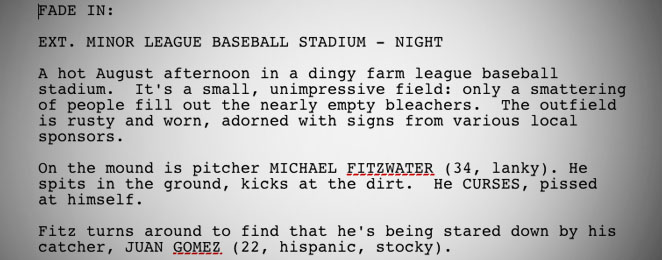Recently, I was lucky enough to be a semi-finalist for the Enderby Award at the 2013 Austin Film Festival for a spec feature script I wrote at the start of this year. While I didn’t move up to the finals (blast!), I still consider it to be quite the honor. It also made me think a lot more about the craft of writing in general.
I’ve been attempting to write screenplays (with various success) since I was teenager. I completed my first feature at 16 (it’s awful). Fortunately, with each thing I write, I get a little better.
There’s no secret to becoming an amazing writer. You have to—you know—write. But, I thought that’d I’d share ten tiny pitfalls (the internet loves lists) to avoid when working on your next screenplay. Now, this list isn’t about the “big stuff.” You want to know about plot structure or what makes for compelling characters? Read Save the Cat.
Rather, my goal is to inform you, intrepid reader, about some of the simple, surface stuff you can do to make your screenplays better and more professional.
Alright. Prefacing is boring. List on!
1.) Bad Spelling and Grammar
Seems simple, right? Well, I can’t tell you how many screenplays I’ve read from other writers that contain spelling and grammatical mistakes within the action blocks of the page. Yes, I realize that if the film is ever made, those spelling mistakes won’t mean hooey. Yet, on the page, it makes your screenplay look and feel cheap—like it’s the first draft (even if it’s the 20th). It’s a subconscious shrug to all your potential readers telling them, “eh…I don’t really care all that much.”
2.) Having Characters Refer to Each Other by Name
I’d much rather not know a character’s name than to have it said in dialogue every time that character is addressed in a movie. Think about it like this: when you’re hanging out with your best buds and bud-dettes, how often do you actually call someone by their first name? Maybe to get their attention, yes, but in general conversations? Doesn’t happen often. I gosh-darn guarantee it. As is the case with most things on life, Albert Brooks said it best.
3.) Using Cliches in Dialogue
Again, this one seems obvious. Yet, clichés, like tramp stamps, happen to people more often than you might think. Admittedly, in real life, people speak in clichés (when was the last time you talked to somebody about the weather—good lord, buddy, we get that it’s not the heat, but the humidity). But, movies are about interesting people, and for the most part, interesting people don’t say worn out phrases. This is a pitfall I still struggle with all the time mainly because clichés are easy—they’re a shortcut to express a complex idea. They’re idiomatically a part of culture. Still, if possible, avoid using them like the plag…um…avoid using them at all cost…DAMMIT! Writing is hard.
4.) Having characters say “Look” or “Listen”
So, one of your side characters needs to explain something to your protagonist. Oh, how are you ever going to let the audience know that it’s serious exposition time? I got it! He’ll start the sentence by saying “Look.” As in, “Look, John, the satellites need to be aligned in order for us to read the alien signal.”
Okay, this one isn’t that big of a deal, but try to avoid prompting exposition with dialogue buzzwords. Exposition is never easy, but it’s even worse when a character has to announce the fact that he’s explaining something.The same could be said about the “You just don’t get it, do you?” trope. Again, this is something I still do often. Yet, much like that tub of ice cream I just finished by myself, I’m not exactly proud of it.
5.) Scenes Driven By plot, Not Conflict
If you have a scene that just exists to drive the plot forward (i.e. I need to get my two main characters out of the house and into a car), it’s a crappy scene. Either the two leads need to argue about getting into said car, or better yet, the scene shouldn’t exist in the first place. Conflict is story. Story is conflict. Every scene in your script—every last one of them—needs conflict. Scenes where people talk about stuff just so they can move to the next major plot point are boring.
6.) Taking Every Note
Ah…criticism. Fun! As a content creator, criticism is tough—we know our work isn’t perfect, but still, it hurts when people crap over stuff we’ve worked and spent a lot of time on. So, when receiving feedback, pay attention. Be courteous. But, also, don’t take every note. Deciding what feedback to take and what to ditch can be a quixotic endeavor. In general, be willing to throw away just as many notes as you receive. Where’s a good place to start? If multiple people bring up the same problem, that may be something at which to take a closer look. Conversely, if Uncle Phil doesn’t like the fact that the main character uses the F-word a lot? Well, you can ignore that one. Because…seriously…F-ck Uncle Phil.
7.) Ignoring Every Note
The other end of the spectrum. You think you’re the perfect artist. You ask for notes, but don’t really want them. Rather, you really want a subliminal pat on the head—a sense of validation from your peers informing yourself how smart you are. You are a douchebag.
8.) Using Dialogue when Silence will Do
As someone who likes to hear himself talk (both in real life and through my characters), this is one that I still haven’t mastered. I’m a verbose writer. Often times, my dialogue is way too on the nose. But, I’m learning…I’m getting better. Mastering subtext is what separates a good script from a great one. If you can figure out a way for your character to convey a response or say something without literally saying anything, do it. Always opt for silence if given the choice between action and dialogue. Por ejemplo, let’s say that one of your characters is a waitress and she’s been a real jerk to her customer. When she realizes the error of her ways, instead of saying she’s sorry outright (that’s boring), have her fill up the customer’s coffee. Or, not charge for the meal. You know, say what you want to say without saying anything.
9.) Every Character Sounds the Same
If you can literally swap the dialogue between characters and it doesn’t effect the story, that’s a problem. It also could be a symptom that you have too many characters. To go a little screenwriter 101 on you, every character needs a unique voice. But, to break that down a little more, having too many of the same kind of voices in a script can be disastrous too. Everyone can’t be the witty sarcastic guy—like an awful parallel universe where every character in Friends was Chandler. That’s a snark cocktail that I have no interest in drinking. Catching the jib of my slang, home slice?
10.) (Parentheticals)
In screenplays, parentheticals indicate how dialogue is supposed to come off (nervous) or be read (sarcastic). But, if at all possible, avoid using them altogether (unless absolutely necessary). If you need to use words to tell the reader how to say a line, the fault may lie within the dialogue itself. Now, this is one that I have been very guilty of. Luckily, someone read my script, smacked me in the face, and told me I was being amateurish with my excessive parentheticals. Now, I’m on the slow road to recovery. Besides, your actors don’t want to be told how to say stuff. After all, that is kind of their job.
Okay, there you have it—10 tiny pitfalls that could make a big difference in your writing (that sentence was cliché as hell. Minus ten points for Gryffindor). See…I’m not immune to this stuff either.
Happy Writing!


